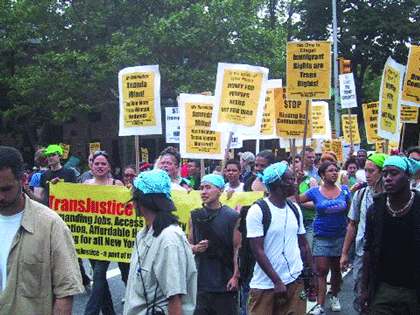Organizers cite lack of police cooperation; one cop slights the crowd
Though they had no permit to march, roughly 500 people turned out for the second Trans Day of Action for Social and Economic Justice on June 23.
“As you all know, the police have us cornered in this park, but we will not be intimidated,” said Lourdes Hunter, a member of TransJustice, at a rally held in Chelsea Park at 10th Avenue and 28th Street prior to a march in which the crowd was for the most part confined to sidewalks.
At least one police officer was overheard making derogatory comments about the participants.
“We will march and we will rally wherever we want,” Hunter said later in the rally.
TransJustice, which organized the event, sought a march permit and a sound permit from the police department beginning in May. During three meetings, the last one coming on June 19, the police department refused to give the group either permit.
The organizers charged that at one meeting Assistant Chief Bruce Smolka — the commanding officer of the Patrol Borough Manhattan South, which covers Manhattan below 59th Street — suggested that they “Go back to the village.” That remark incensed the organizers.
The spirited rally lasted roughly an hour and included speakers from the Sylvia Rivera Law Project, which is a transgender rights advocacy group, Queers for Economic Justice, the Green Party, Jews for Racial and Economic Justice, the Lesbian, Gay, Bisexual and Transgender Community Center, the Metropolitan Community Church, and Housing Works, an AIDS services and advocacy group. Some of those speeches reflected the tension between organizers and the police.
“We have a right, even if the government doesn’t recognize it, to assemble peaceably,” Joann Prinzivalli, director of the New York Transgender Rights Organization, told the crowd.
Two friends of Amanda Milan, a trans woman who was slain in 2000, addressed the crowd. Organizers had hoped to march to 42nd Street and Eighth Avenue, the site of Milan’s murder, but they changed that plan when a march permit was denied them.
Organizers also hoped to rally outside the offices of city’s Human Resources Administration (HRA) just below 34th Street, but that was plan was dropped as well.
The police said the organizers were offered a stationary rally at the HRA office and at the site of Milan’s killing, but that a march on two major city streets late on a Friday afternoon would snarl traffic. The group was offered the same route it took last year—starting in Abingdon Square at Eighth Avenue along 14th Street to Union Square but declined that.
The march headed north on Eighth Avenue, turned east on 40th Street, went south on Seventh Avenue, and ended outside the Community Center on West 13th Street where marchers were invited to join a party in the Center’s courtyard.
Deputy Chief Michael Coan, the executive officer of the Patrol Borough Manhattan South, said that the marchers had to stay on the sidewalk. Some marchers briefly tried to take the street on 40th Street, but police blocked them. Coan also said the marchers could walk no more than three abreast.
The police did not enforce that latter instruction nor did the marchers abide by it. The result was that pedestrians were forced off the sidewalk into the street. They were protected from traffic by a line of police scooters and vehicles that occupied a lane next to the sidewalk.
The marchers kept up lively chants and were accompanied by drums and, at one point, a trumpet. Organizers also kept up a negotiation with Coan during the march, suggesting that if the march took a single lane of traffic it would move faster. In a gesture that was largely symbolic, Coan allowed the march onto the street at 14th Street for its final block. Standing outside the Community Center, Coan thanked the organizers.
“That was great,” he said. “The marshals were great.”
As much as the marchers may distrust and dislike the NYPD, the police also revealed their distrust, and perhaps dislike, of the marchers. A Detective Frasier with the NYPD’s Technical Assistance Response Unit was seen repeatedly videotaping the march. He would not answer questions about his activity nor would a representative from the police department’s legal bureau.
In an ongoing lawsuit, the New York Civil Liberties Union charges that such surveillance of First Amendment activities is unconstitutional. The police claim it is lawful and necessary.
As the march headed uptown, Captain Stephen Hughes, the commanding officer of the 10th Precinct, was heard saying on his cell phone, “You’re missing a great transgender rally. Only in New York. I got he shes and she hes.”
Asked about this comment later, Hughes said, “I didn’t say that, I didn’t say that.”
The day after the march, Imani Henry, a member of TransJustice, said of Hughes’ comment, “We had a chant yesterday that was very clear. ‘No justice, no peace, no transphobic police.’ We don’t have any expectation that police will have any kind of sensitivity around trans people… It’s not a surprising kind of comment.”
gaycitynews.com



































